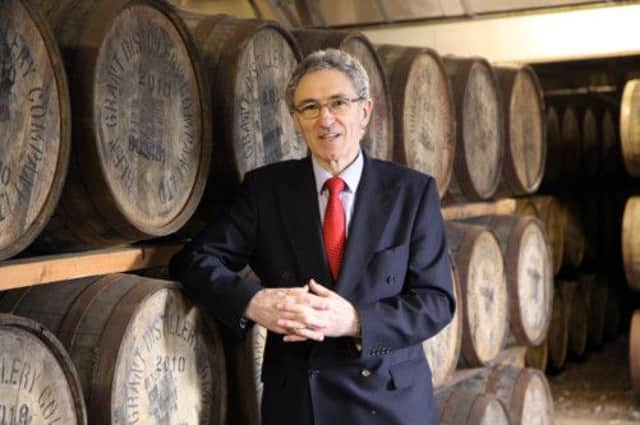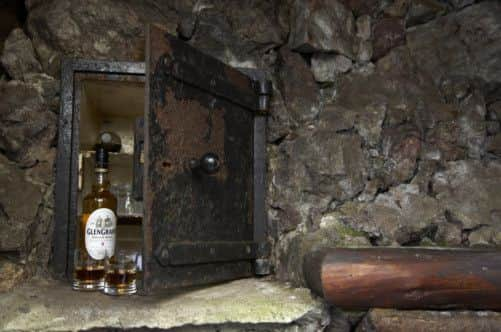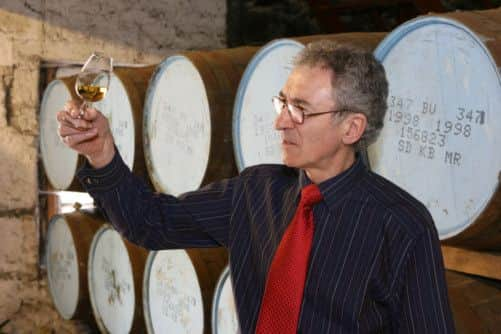Spirit of change: 50 years in Scottish whisky trade


In 1961, the year The Beatles played their first gig in Liverpool’s Cavern, Dennis Malcolm started work as an apprentice cooper at Glen Grant Distillery in Rothes. He was 15. Over half a century later and after stints at several other distilleries, Malcolm is still at Glen Grant. Only now his job title has changed to Master Distiller and he is the man responsible for producing up to a thousand barrels of spirit each week in the Speyside plant.
Malcolm, though, remembers his first day at Glen Grant vividly. ‘It was terrifying,’ he says. “I knocked on the door of the head cooper and, when he told me to come in, I hid behind the door. They had a lot of fun with me.”
Advertisement
Hide AdWhatever initiation pranks were in store for him, Malcolm was always going to be in the whisky industry. He jokes that the path was set when his mother rubbed new-make spirit on his gums when he was teething. “Spirit cured everything back then,” he says.


Homespun remedies aside, his family’s links with Glen Grant go back generations. His grandfather worked for James ‘The Major’ Grant who, in 1872, had inherited the business from its founders. The Major’s grandson, Douglas MacKessack, employed both Malcolm and his father. Malcolm was actually born in the distillery grounds. “In those days, the distillery had 47 houses on the grounds and they were part of the workers’ package. You didn’t get big pay but they gave you a company house and peat from the hills for your fire.”
While the 1960s may have swung in London, Rothes was, it’s fair to say, less of a party town, although Malcolm concedes that his younger self went to his share of dances. Perhaps even one or two where whisky was taken. However, if rock ‘n’ roll was beginning to transform society in the the south, it did not have much impact on the working environment of the cooperage at Glen Grant.
“You started work at 6.30am,’”says Malcolm. “In the 1960s, you had to be at work on time and you could not leave early. It was very Victorian in style. You had two weeks’ holiday in the summer and that was it. You didn’t get a day off for Christmas or New Year, but you did get one hour longer for lunch on Christmas Day. The main purpose of that was to hear the Queen’s speech.”
That may sound harsh to modern ears, but other aspects of life in a 1960s distillery seem almost Bacchanalian to contemporary sensibilities. Up until around 1978, it was common for distillery workers to be given whisky while they worked. Each shift, workers would knock back three stiff belts of new spirit at around 60 per cent alcohol.


Understandably, health and safety concerns put a stop to that. But if the practice of dramming led to accidents , it also had a lighter side. At one unnamed distillery, Malcolm recalls receiving a telephone call from an operator, now deceased, who thought that the still house was on fire. In fact, a combination of spray from a water wheel, refracted sunlight and whisky had given the illusion of a blaze. Malcolm can laugh about it now. One imagines it was less amusing on the day.
Advertisement
Hide AdThe idea of drinking on the job is as unthinkable to most of today’s workforce as putting in a shift on Christmas Day. Just as society has changed over the course of Malcolm’s career so has the whisky industry and automation was the most radical change of all. It started gently at Glen Grant. In 1962, the Russians sent the first woman into space. Three years later, Malcolm was still struggling to convince his boss that a forklift would be a good idea.
“At that time, we were rolling barrels everywhere by hand. The day we got that forklift it felt as though we had entered the Space Age.”
Advertisement
Hide AdNaturally, the pace of change accelerated. During the 1970s, North Sea oil hit Aberdeen and the oil industry was using new-fangled computerised systems to run their operations. The whisky industry was not slow to catch on. Malcolm’s work in the cooperage was done with hammers, drivers and bow saws, as it had been for 100 years. In the early 1970s, Malcolm, who had by then moved to the production side of whisky making, had a new tool to work with: an early computer called the Allen Bradley Programmable Controller. It had much the same effect on the whisky industry as the combustion engine had on transport. Rather than DVDs or USB sticks, it was programmed by cassettes. One cassette could control all of the malting process; one cassette did the stills; one did the mashing. You didn’t need hundreds of switches anymore. It was just one unit. When you automate, you can run the entire distillery with one man.”
The system was not without its hiccups. During the long, hot summer of 1976, the heat caused the controller to malfunction. IT technicians had yet to be invented, but one of the distillery’s electricians solved the problem by putting the offending circuit board in the canteen fridge.
Automation meant job losses among distillery workers, but Malcolm does not believe the switch caused a net loss of jobs. “There are less people producing but there are just as many jobs in the industry post-automation. The industry has grown and, because we are producing more, you need more coopers to make the casks; more farmers growing barley; more maltsters and more construction engineers building warehouses. From the 1970s, the industry became more high-tech on the production side. The result was fewer jobs in production but the jobs are still there in all the supporting roles.”
From fighting for the forklift to seeing the possibilities of automation, Malcolm has long championed technological change in this most traditional of industries. He argues that progress will never be stopped and it is pointless to oppose it, but he also champions innovation for another reason: it allows him to sleep at night. “I’m a quality control freak. Whisky has to have a consistent quality. During all my time in the industry, people ask why I like computers. Computers can check alcohol strength and timings and all the other things you need to keep an eye on when making whisky. They can run these checks hundreds of times a second. With computers, I can protect the quality of the product all the time. I can sleep easily at night knowing that the quality is protected.”
Malcolm’s experience and dedication has led Gruppo Campari, Glen Grant’s owners, to release a whisky, Glen Grant Five Decades, to celebrate his time in the industry. A blend of vintage single malts from the last five decades, the limited-edition bottling is a good indicator of the high esteem which Malcolm enjoys at Glen Grant.
The respect has been well earned down his 50 or so years in an industry that has seen much technological development, but the Master Distiller knows some aspects of the business will never change. “I’m now laying down spirit in sherry hogsheads and butts that will stay down there for 25 to 30 years. I will never see that come to its full potential. It’s like a gardener planting an oak tree, you never see it mature completely but you can visualise it. Making whisky is a craft and a tradition which previous generations have worked on. I’m doing the same for future generations”.